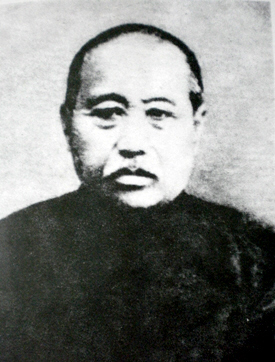Zhang Xichun
Chinese physician and scholar of traditional Chinese medicine
Zhang Xichun[edit | edit source]
Zhang Xichun (1860–1933) was a prominent Chinese physician and scholar known for his contributions to the integration of traditional Chinese medicine (TCM) with Western medicine. His work played a significant role in the modernization of Chinese medical practices during the late Qing dynasty and early Republic of China period.
Early Life and Education[edit | edit source]
Zhang Xichun was born in 1860 in Tianjin, China. From a young age, he showed a keen interest in medicine and pursued studies in both traditional Chinese medical texts and Western medical literature. His education was marked by a deep understanding of classical Chinese medical theories as well as a curiosity about Western medical advancements.
Medical Career[edit | edit source]
Zhang began his medical practice in Tianjin, where he quickly gained a reputation for his skillful treatments and innovative approaches. He was particularly interested in the application of Western diagnostic techniques and treatments within the framework of traditional Chinese medicine.
Integration of TCM and Western Medicine[edit | edit source]
Zhang Xichun is best known for his efforts to integrate TCM with Western medical practices. He believed that the strengths of both systems could be combined to improve patient outcomes. Zhang advocated for the use of Western diagnostic tools, such as the stethoscope and microscope, alongside traditional Chinese herbal remedies and acupuncture.
Publications[edit | edit source]
Zhang authored several influential texts, including "Yixue Zhongzhong Canxi Lu" (_________), which translates to "Records of Traditional Chinese Medicine with Reference to the West." This work outlined his theories on the integration of the two medical systems and provided case studies demonstrating the effectiveness of his methods.
Legacy[edit | edit source]
Zhang Xichun's contributions to medicine have had a lasting impact on the field of integrative medicine in China. His work paved the way for future generations of physicians to explore the synergies between traditional and modern medical practices. Today, Zhang is remembered as a pioneer who helped bridge the gap between Eastern and Western medicine.
Related Pages[edit | edit source]
Search WikiMD
Ad.Tired of being Overweight? Try W8MD's NYC physician weight loss.
Semaglutide (Ozempic / Wegovy and Tirzepatide (Mounjaro / Zepbound) available. Call 718 946 5500.
Advertise on WikiMD
|
WikiMD's Wellness Encyclopedia |
| Let Food Be Thy Medicine Medicine Thy Food - Hippocrates |
Translate this page: - East Asian
中文,
日本,
한국어,
South Asian
हिन्दी,
தமிழ்,
తెలుగు,
Urdu,
ಕನ್ನಡ,
Southeast Asian
Indonesian,
Vietnamese,
Thai,
မြန်မာဘာသာ,
বাংলা
European
español,
Deutsch,
français,
Greek,
português do Brasil,
polski,
română,
русский,
Nederlands,
norsk,
svenska,
suomi,
Italian
Middle Eastern & African
عربى,
Turkish,
Persian,
Hebrew,
Afrikaans,
isiZulu,
Kiswahili,
Other
Bulgarian,
Hungarian,
Czech,
Swedish,
മലയാളം,
मराठी,
ਪੰਜਾਬੀ,
ગુજરાતી,
Portuguese,
Ukrainian
Medical Disclaimer: WikiMD is not a substitute for professional medical advice. The information on WikiMD is provided as an information resource only, may be incorrect, outdated or misleading, and is not to be used or relied on for any diagnostic or treatment purposes. Please consult your health care provider before making any healthcare decisions or for guidance about a specific medical condition. WikiMD expressly disclaims responsibility, and shall have no liability, for any damages, loss, injury, or liability whatsoever suffered as a result of your reliance on the information contained in this site. By visiting this site you agree to the foregoing terms and conditions, which may from time to time be changed or supplemented by WikiMD. If you do not agree to the foregoing terms and conditions, you should not enter or use this site. See full disclaimer.
Credits:Most images are courtesy of Wikimedia commons, and templates, categories Wikipedia, licensed under CC BY SA or similar.
Contributors: Prab R. Tumpati, MD

